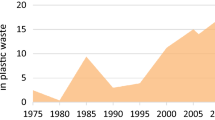Abstract
Social concern with appropriate disposal and recycling of E-waste and scrap has been increasing for decades in Taiwan and elsewhere. In Taiwan, to prevent environmental pollution and promote appropriate recycling, the Environmental Protection Administration (EPA) has introduced a government-managed recycling system dubbed the Recycling Fund Management (RFM) system. Under the RFM system, producers (manufacturers and importers) have an obligation to pay recycling fees to the RFM committee of the EPA. There are 33 targeted items in 13 categories, such as home appliances, IT equipment, tires, motor vehicles, dry batteries, and so on. Recyclers who participate in the recycling system are subsidized by the RFM committee according to their recycling performance. To enter the recycling fund system, recyclers are required to meet standards for proper operations, and must have obtained authorization to treat and recycle wastes. Additionally, to get the subsidy, recyclers have to establish weighing and monitoring facilities and maintain a recycling rate of at least 75%.
In recent years, the EPA has promoted the greening of producers by differentiating environmentally-friendly goods from others by setting different recycling fee rates for goods in each category. The quality standard that recyclers must meet to obtain the subsidy has become gradually more severe. Encouraging the greening both of production and recycling processes is desirable, and producers may be able to follow the greening path. Recyclers also need to satisfy a quality standard under the RFM system. However, it is sometimes hard for recyclers to meet the required quality because it depends on several factors beyond their control, such as original state of discharge and transportation and storage conditions. If recyclers need to take full responsibility not only for their own faults but also for stochastic risk which affects the quality of their recycling and which is beyond their control, the RFM system will become less attractive to them. That means strengthening the regulation on recyclers may prompt them to exit from the RFM system, increasing the risk of environmental pollution caused by uncontrolled treatment of potential pollutants.
In this paper, using a theoretical model, we examine the effects of the greening policy of the Taiwan government on the amount of recycled E-waste, the scale of the recycling market, the risk of environmental pollution, and the social welfare of Taiwan. To this end, we build a simple model including two markets: production and recycling under a deposit-refund system like the RFM system in Taiwan. The E-waste that is not treated under the RFM system has a negative impact on the environment in this model. We also set differentiated tax and subsidy rates as is characteristic of the recycling system in Taiwan. The approach we employ in this model is comparative statics. With theoretical analysis, we find some implications of the greening policy in Taiwan.
Similar content being viewed by others
References
Akaishi, H., R. Murakami-Suzuki, and K. Nambu (2015) “An Economic Evaluation for the Waste and Recycling Policy of Japan and Taiwan,” paper presented at the 5th Congress of the East Asian Association of Environmental and Resource Economics.
Akaishi, H. and K. Nambu (2015) “An Economic Analysis of Taiwanese Recycling System — Positive Aspects of a Deposit-Refund Policy-,” paper presented at Society for Environmental Economics and Policy Studies annual congress.
Choe, C. and I. Fraser (1999) “An economic analysis of household waste management,” Journal of Environmental Economics and Management, 38, 234–246.
Fan, K.S., C.H. Lin, and T.C Chang (2005) “Management and Performance of Taiwan’s Waste Recycling Fund,” Journal of Air & Waste Management Association, 574–582.
Hong, I.H., Y. C. Chang, and C.S. Cheng (2007) “Studies on subsidy and disposal fee determination in e-scrap reverse supply chains;” The 8th Asia Pacific Industrial Engineering & Management System, December, Taiwan.
Hong, I.H. and J.S. Ke (2011) “Determining advanced recycling fees and subsidies in “E-scrap” reverse supply chains,” Journal of Environmental Management, 92, 1495–502.
Hong, I.H., Y. L. Lee, and P.Y. Chang (2014), “Socially Optimal and Fund-balanced Advanced Recycling Fees and Subsidies in a Competitive Forward and Reverse Supply Chain,” Resources, Conservation and Recycling, 82, 75–85.
Lee, C.H., S.L. Chang, K.M. Wang, and L.C. Wen (2000) “Management of scrap computer recycling in Taiwan,” Journal of Hazardous Materials, A73, 209–220, Elsevier.
Li, H.Y. (2005) “The impact of three EU environmental directives on the electronics industry in Taiwan,” http://www.campaign.hncb.com.tw/intranet/monthly/mon028/02806.pdf(in Chinese).
Lin, C. C. and C.H. Lin (2005), “What substances or objects should be recycled? The recycling legislative experience in Taiwan,” Journal of Material Cycles & Waste Management, 1–7.
Murakami-Suzuki, R (2007a), “Current status and issues surrounding recycling policies for waste home appliances in Taiwan, Journal of the Japan Society of Waste Management experts, 18(4), 250–263. (in Japanese)
Murakami-Suzuki, R. (2007b), “E-waste recycling systems with Extended Producer Responsibility in selected East Asian and European countries, Proceedings of the Fourth NIES Workshop on E-waste, 179–189.
Murakami-Suzuki, R., Chung, S.W. (2008), “A comparative analysis of E-waste recycling systems in Japan, South Korea, and Taiwan”, in Recycling Asia (IDE Research Series No. 570), 299–345. (in Japanese)
Wen, L.C. (2006) “A study of definition to waste recycling items and impact factors of fee settings,” Project report in EPA Taiwan (in Chinese).
Author information
Authors and Affiliations
Corresponding author
Rights and permissions
About this article
Cite this article
Nambu, K., Murakami-Suzuki, R. Greening policy of production and recycling in Taiwan. IJEPS 11, 25–42 (2016). https://doi.org/10.1007/BF03405764
Published:
Issue Date:
DOI: https://doi.org/10.1007/BF03405764




